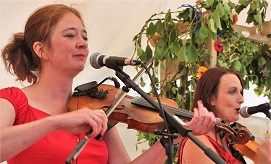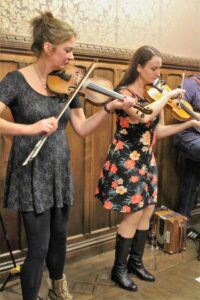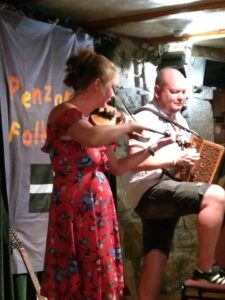
JULIA LEE BARCLAY-MORTON – YOGA, WATER AND REWRITING AUTISM
I interviewed writer Julia Lee Barclay-Morton about her experience of autism. Julia began as an experimental dramatist in New York, moving to the UK to


Interview with modern and traditional folk singer & violinist Jess Arrowsmith who talks about her bands, teaching and composing music, working with other musicians and putting nursery rhymes to music. As Jess says of herself: “For me, singing with other people is incredibly rewarding emotionally, physically, spiritually, socially, you name it!”
Leslie: What’s important and rewarding about folk music today?
Jess: For me, folk music is all about the connections with people’s lives, whether that is people responding to a live performance or recording, or whether it is in a teaching situation. I’ve written a few songs that people have used as part of their wedding ceremonies, I’ve had feedback from people saying that workshops that I’ve taught have changed their lives in some way, and that is definitely the most rewarding part of what I do. I am quite open about my own emotions when I perform and teach, and feel that I am honestly sharing my own take on the world, and it is wonderful when I feel that has helped somebody. I think folk music and song is a fantastic medium for that. It is very free and unrestricted and so you can make of it what you will and take from it what you need.
Leslie: So how did folk music first came into your life and how it has developed since?
Jess: When I was little, my dad played guitar and sang at home a lot – he’d run a folk club as a student and was into Bert Jansch, Leonard Cohen and Ralph McTell amongst others. We lived in Durham until I was seven and my mum and older sister both did some North East step clog, so folk music, song and dance were just always there. I started having violin lessons at five, though followed a fairly standard classical route with it to start with.

We then moved to just outside Whitby and started to go to Whitby Folk Week – just occasional ceilidhs and watching the dancing in the street at first. Then when I was 11 and about to start going to secondary school in Whitby itself my parents got me a youth season ticket as a way of encouraging me to start getting around the town a bit more independently, and I was hooked. I would circle every fiddle workshop on the programme and try to get to them all. I particular remember workshops with Tom McConville, Willie Taylor, Gina Le Faux and Robin Garside. There were fewer events aimed at ‘youth’ at that point (early 1990’s) than there are now so I would be trailing round upstairs rooms in pubs with my fiddle and being the youngest person in the room by about 30 years some of the time, and I loved it. In the evenings my sister and I would go to ceilidhs every night and dance nearly every dance (oh to have that much energy!) I started playing more folk music alongside the classical lessons and exams and local Youth Orchestra on Saturday mornings.
When I was about 16 my parents and I started a ceilidh band with a friend – me on fiddle, my dad on guitar, our friend Sue on various woodwind and my mum calling. Meanwhile my sister and I went to Towersey Village Festival a few times and I went to Sidmouth on my own at the age of 17 and met my partner, Richard. The following year I chose to go to Sheffield for university, as much for its folk scene as for its Maths department, and 25 years later I’m still based in the city. Through the University Ceilidh Society, Rich and I met lots of like-minded musicians with whom we formed ceilidh band Hekety in 1997, concert band Crucible in about 1999 and Morris team Pecsaetan in 2001. Performing with Crucible brought singing to the fore for the first time – I’d always sung for fun but never very formally. With Crucible we travelled to festivals in Canada and Europe as well as all over the UK and started teaching harmony song workshops.
In 2010, Crucible came to an end as a band, at a time when I was heading back into work after a year’s maternity with our first baby, wanting to work part time office hours, and needing to maintain other sources of income. Richard and I started to gig as a duo (a more financially viable way to do smallish folk clubs than a four piece band) but we also began to perform with Nancy Kerr & James Fagan, who’d recently moved to our street in Sheffield and were also finding their way forward as new parents.
The Melrose Quartet has been a whirlwind of new music and song – working with Nancy and James has been a huge inspiration, and I genuinely love singing and playing with the band. Both gigs and rehearsals are a great source of joy in my life. I’ve written more songs as I’ve got older, and have also developed as a teacher. These days I run regular singing evening classes and one-off workshops focussing on helping singers gain confidence, improve technique, and enjoy singing with others in harmony, I teach privately, and also am artistic director for the National Youth Folklore Troupe of England (NYFTE) – a team of 10-18 year olds who perform all aspects of traditional dance, music and song. I find working with young people incredibly exciting and creative – you give them a starting point and they absorb it like sponges but then continuously evolve it into something new.
Leslie: Can you describe the process from start to finish of conceiving and realising your own compositions, please.
Jess: I am not a very prolific composer and I usually have to let a spark of inspiration arrive from somewhere before I can write. That’s not to say I can’t decide I want to write on a particular subject, or create a song with a particular feel, but if I start off with the desire to write I still have to then wait for inspiration to strike. I tend to start with one aspect of a song (whether that is the story or theme, the chorus, the tune, or just a chunk of lyric) and build outwards from there. Sometimes in the process of creating the song though new bits of inspiration occur which then change the course of the original idea, I find it very unpredictable. It can also take a long time. Sometimes I’ll capture a first spark of inspiration but it floats around for years before the rest of the song catches up with it. I also rewrite a lot. Once I’ve got the initial idea and write a set of lyrics I might sit on them for weeks, tinkering and reshaping, before I show them to anybody else.
I would however say that I’ve written more songs whilst travelling than at any other times. I’ve written in the car (both driving and being a passenger), on my bike, and on trams, trains and aeroplanes. I think it is probably because while I’m travelling I can’t get as busy doing anything else but the act of travelling involves a lot of sitting around so I’ve got spare capacity to mull over my creative ideas.
Leslie: Working with other musicians you use a lot of traditional instruments. Can you tell us about the challenges and rewards of learning to play (or perform with) a few unusual instruments?
Jess: I’ve always enjoyed the ensemble aspect of playing instrumentally – I’m not the type of musician who spends hours playing on their own. When I practice, it is because I’m wanting to achieve something specific. So, the interplay between what I am doing and what the other musicians are doing is the most enjoyable part of the experience for me – and tonal variety is a key part of what is going on. Much of the time that has come about because of the people involved, though I’ve rarely sat down and said, “I want to play with xyz instrument, let’s recruit somebody who can play it.” It’s much more often been just, “hey, let’s play some tunes” and I’ve been lucky enough to meet people who play a whole range of different instruments.
One of my favourite things about playing with others is ending up feeling that we’ve created something that is somehow bigger than the sum of its parts. I actually love playing with other fiddle players – multiple fiddles can make a really full sound – but I guess fiddles don’t really count as ‘unusual’! Our good friend Jo Maher is a wonderful oboe and cor anglais player and we’ve recorded a number of CDs with her as a guest over the years – I love the way the double-reeded woodwind can cut through like a trumpet.
Leslie: How do you coach people to sing and respond to traditional music?
Jess: For me, singing with other people is incredibly rewarding emotionally, physically, spiritually, socially, you name it! I genuinely believe that everybody can sing – or at least that everybody has the necessary tools in order to be able to sing, but it saddens me how many people believe that they can’t because then that is a massive barrier to even trying. When I run coaching sessions I mainly aim to break things down into little steps, and to respond to wherever somebody is starting from – so that can be starting from the absolute beginning with vocalising and listening exercises or it can be giving feedback to tweak an already strong performance. My approach is to look as much at how somebody feels about their singing as at vocal technique itself. I share songs that appeal to me but I try not to impose my own musical taste too much because everybody is different!
Leslie: You aim to perform less ‘standard’ or well-known pieces from the folk music tradition. How do you find them and how do you create a historically authentic version that is also your own?
Jess: It varies a lot. Some songs I’ve learned from books or from internet sources, others from down the pub. I do seek out songs that are not ‘common repertoire’ but it doesn’t always work. I’ve lost count of the number of times I’ve performed or recorded a song that I hadn’t come across before only to find that three other bands release recordings of it at around the same time. I guess I spend more time worrying about what a song means to me, than whether it is either less well-known or historically authentic. I do prefer to know the backstory of a song and always at least to try and find out where it is from, and the social history that surrounds whatever subject it covers, mainly because I’m a bit of a geek I suppose.
Leslie: Why do you put Nursery Rhymes to music?

Jess: I got into nursery rhymes simply because when I first had my daughter I would sing to her a lot, all day, every day. It was a way of keeping her calm and happy and also of breaking up the frankly boring bits of caring for a new born. If I need to stomp round the living room carrying somebody who doesn’t want to be put down and doesn’t want me to sit down, I may as well pass the time by singing!
There is a whole bunch of research out there about how music is good for babies brains. It just seems like a good idea to me – certainly both our kids are very musical – though amusingly neither of them will let me sing to them anymore! During that first year of parenthood, I spent so much time singing while around other people that quite a few friends suggested making a CD.
Rich and I made ‘Off We Go!‘, our first Nursery Rhymes cd, just as an experiment really while I was still on maternity leave and it surprised us by being the best-selling CD we’d ever made. We had a lot of fun recording it and getting lots of folky friends to guest on it, and it appears that there was a bit of a gap in the market for what we’d done – a recording of mostly traditional or well-known nursery rhymes, songs and lullabies, with a range of instrumentation and voices that is interesting enough to not drive the parents mad by the 100th listen. Ten years down the line (and a second nursery rhymes CD too) and they still sell well.
As a footnote, just to add that if anybody is interested in my music, our CDs and various pdf arrangements of harmony songs are available here, along with details of gigs and singing workshops.
Next week I interview two environmentalists: actor & artist Judy Liebert who appeared in ‘The History Man’, ‘EastEnders’ & ‘Peak Practice’ and Julian Marsh. professor of architecture at Sheffield Hallam University, specialising in sustainable buildings.
ABOUT LESLIE TATE’S BOOKS:

I interviewed writer Julia Lee Barclay-Morton about her experience of autism. Julia began as an experimental dramatist in New York, moving to the UK to

I interviewed Gillean McDougall from Glasgow, who edited the collaborative projects Honest Error (on Charles Rennie Mackintosh and his wife Margaret Macdonald) and Writing the

I interviewed French writer Delphine de Vigan, whose book, No et moi, won the prestigious Prix des libraires. Other books of hers have won a clutch

I interviewed Joanne Limburg whose poetry collection Feminismo was shortlisted for the Forward Prize for Best First Collection; another collection, Paraphernalia, was a Poetry Book Society Recommendation. Joanne

I interviewed Katherine Magnoli about The Adventures of KatGirl, her book about a wheelchair heroine, and Katherine’s journey from low self-esteem into authorial/radio success and
| Cookie | Duration | Description |
|---|---|---|
| cookielawinfo-checkbox-analytics | 11 months | This cookie is set by GDPR Cookie Consent plugin. The cookie is used to store the user consent for the cookies in the category "Analytics". |
| cookielawinfo-checkbox-functional | 11 months | The cookie is set by GDPR cookie consent to record the user consent for the cookies in the category "Functional". |
| cookielawinfo-checkbox-necessary | 11 months | This cookie is set by GDPR Cookie Consent plugin. The cookies is used to store the user consent for the cookies in the category "Necessary". |
| cookielawinfo-checkbox-others | 11 months | This cookie is set by GDPR Cookie Consent plugin. The cookie is used to store the user consent for the cookies in the category "Other. |
| cookielawinfo-checkbox-performance | 11 months | This cookie is set by GDPR Cookie Consent plugin. The cookie is used to store the user consent for the cookies in the category "Performance". |
| viewed_cookie_policy | 11 months | The cookie is set by the GDPR Cookie Consent plugin and is used to store whether or not user has consented to the use of cookies. It does not store any personal data. |